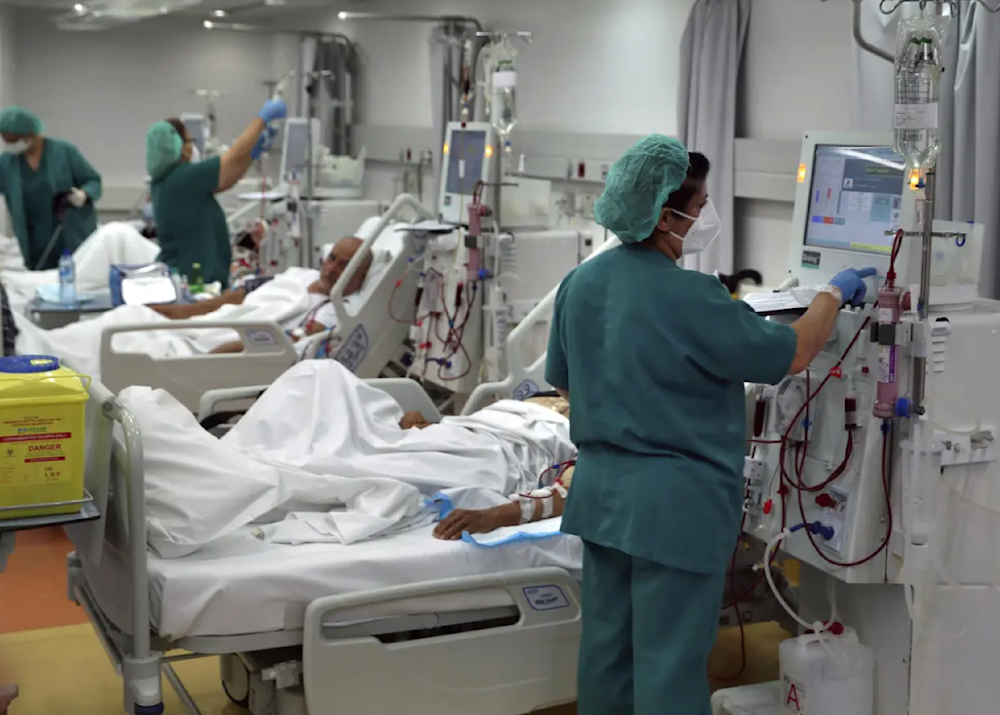UNICEF gives 65 tons of medicine, supplies to South Lebanon hospitals
The UN agency stated that it assisted 10 primary and mobile health care units in the impacted areas of southern Lebanon, where Israeli aggression has been rampant for several months
-

A nurse checks a patient undergoes dialysis at the Lebanese American University Medical Center-Rizk Hospital in Beirut, Lebanon on June 10, 2021. (AP)
On Tuesday, the United Nations International Children's Emergency Fund (UNICEF) said that it had supplied 65 tons of pharmaceuticals and medical equipment to 22 Lebanese public hospitals to help refugees and their hosts throughout the region's warfare.
The United Nations Children's Fund wrote on X that 65 tons of emergency kits with medications, supplies, and instruments were delivered to 22 locations, "including private and public hospitals in South, Nabatieh, Baalbak-Hermel, and Lebanese Ministry of Public Health warehouses, to support the health system in responding to the current emergency,"
The UN agency stated that it assisted 10 primary and mobile health care units in the impacted areas of southern Lebanon, where Israeli aggression has been rampant for several months.
Hezbollah bombs Israeli military base in Nahariya
Three drones launched from Lebanon breached the airspace of the occupied Palestinian territories, an Al Mayadeen correspondent reported.
Reports from Israeli media confirm that one-way drones targeted a vehicle and a military base in Nahariya, resulting in several injuries.
Al Mayadeen's correspondent reported that a swarm of drones, undetected by Israeli anti-air systems, flew over Shlomi, Nahariya, and Akka in northern occupied Palestine.
#Watch | Footage circulating on social media shows a swarm of drones flying over northern "Israel". According to #AlMayadeen's correspondent, the drones passed undetected over the areas of Shlomi, Naharayya, and Akka, located north of occupied #Palestine. pic.twitter.com/L0m61y0ZJW
— Al Mayadeen English (@MayadeenEnglish) August 6, 2024
Israeli media outlets claimed that two individuals sustained injuries in the settlement of Mazraa near Nahariya, one of which is critical and the other moderate.
Further reports indicate that fires erupted within a military base in Nahariya following the attack by multiple drones. Another Israeli media outlet mentioned a critical injury from a direct hit south of Nahariya, while other sources confirmed that the drones struck two different areas in the city.
A fatality was reported in western al-Jalil after a drone exploded before sirens were sounded once again in Akka and northern settlements after the drone attacks. Israeli media reported sirens in Akka, Bustan HaGalil, and Shomrat amid fears of another drone infiltration.
The head of the Mazraa settlement council near Nahariya stated, "We are 12 kilometers from the border with Lebanon and do not have bomb shelters in the settlement."
Iran, Hezbollah retaliation to put shaky Israeli air defenses to test
The history of Israeli invasions of Lebanon is marked by failure and "Israel’s" renowned Iron Dome air defense system risks being overwhelmed by the sheer volume of Hezbollah's missiles, suggested John Sawers, former head of the British Secret Intelligence Service MI6 and UK ambassador to the UN.
In an opinion piece published in the Financial Times news website, Sawers highlighted that Hezbollah poses a great threat to "Israel" with its arsenal of rockets and missiles and its claimed 100,000-strong fighters.
He mentioned that when Israeli Prime Minister Benjamin Netanyahu's military chiefs wanted to invade Lebanon after October 7, the premier "held them back."
However, according to Sawer, it seems that Netanyahu's "thinking seems to have evolved," adding that the unwritten rules that govern the low-level fighting between "Israel" and Hezbollah indicated that the assassination of top Hezbollah commander Fouad Shokor in Beirut was not justified by the missile that struck the Druze town of Majdal Shams in the occupied Syrian Golan.
"It was a deliberate escalation by Israel," he suggested.
Sawers considered that "Israel's" assassination of the head of Hamas' Political Bureau Chief Ismail Haniyeh in Tehran and Shokor in Beirut revealed Netanyahu's priorities and strategy.
The Israeli Prime Minister "is prepared to escalate tensions in the region rather than seeking to calm them," he pointed out.
Sawer said that Haniyeh's assassination also proves that Netanyahu is not interested in a ceasefire in Gaza and a prisoner exchange deal with Hamas, adding that the release of Israeli captives held in the Gaza Strip "doesn’t feature prominently in his strategy" as he has turned down numerous deals supported by his own security officials.

 4 Min Read
4 Min Read








